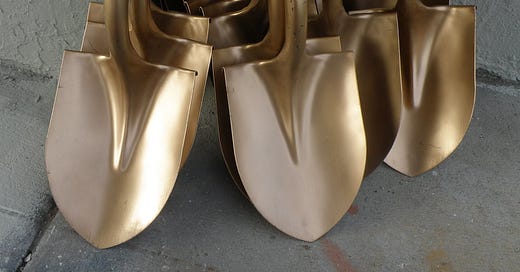I like to think of literature as a big long slow conversation — or perhaps a whole room full of braiding conversations. Everything we write is in conversation with other things people have written. Other love poems, other fart jokes, other odes, other sci fi stories, other things set in Seattle, other stories about telepathic nine-year-olds who hate tuna salad as well as all the stories about non-telepathic nine-year-olds with and without opinions about tuna salad. Sometimes we are conscious of these conversations, and we reference other writing in our writing. Sometimes we think we’ve invented something in a vacuum, which simply is never true. I mean, if you think anything is truly isolated, remember about aeroplankton connecting continents. Anyhow.
As I think about the conversation that is literature, I think about forms that have been used for centuries — sonnets, ghazals, odes. And I also think about new forms, how the conversation is always changing.
Golden Shovels are a new form of poetry, invented by Terrance Hayes. The title is a reference to the poolhall in Gwendolyn Brooks’ poem “We Real Cool,” and the words in that poem are the last word in each line of Hayes’s form-founding poem “The Golden Shovel.”
Shovel Rules:
That’s the whole rule of Golden Shovels: the last word of each line forms a quote or a poem — often a Gwendolyn Brooks poem, especially “We Real Cool.” The last word of a line doesn’t have to be the last word of a sentence, and this poem is a great way to play with enjambment — not ending lines at the ends of sentences — as well as to honor poems and quotes we like (or hate, I guess).
My students really enjoyed and were challenged by writing Golden Shovels, and were excited to participate in a new form of poetry.
P.S. Hayes’s poem feels like it would mostly resonate with older readers, but we found many other examples of Golden Shovels at the Young Poets Network — which is a great resource in general.




